Flash! Pope Francis says the Bible is a “dangerous book”
Is the Bible a dangerous book?
Maybe the Bible is not a dangerous book in our country. But it is in other countries. Pope Francis reminds us just how dangerous. In some countries, people face death for the mere possession of a Bible.
“There are more persecuted Christians in the world today than in the early days of the Church. And why are they persecuted? They are persecuted because they wear a cross and bear witness to Jesus. They are convicted because they own a Bible,”
Perhaps we unconsciously think that we don’t have time for the Bible. Perhaps we are afraid to be alone with the God we find in the scriptures. Could these be the reasons we don’t read the Bible that much?
With simplicity, Pope Francis shares his own bible reading habits.
“Often I read a little and then put it away and contemplate the Lord. Not that I see the Lord, but he looks at me. He’s there. I let myself look at him. And I feel—this is not sentimentality — I feel deeply the things that the Lord tells me. Sometimes he does not speak. I then feel nothing, only emptiness, emptiness, emptiness…. But I remain patiently, and so I wait, reading and praying.”
“But it does not matter,” he said. “I’m like a son with the father, and that is what is important.”
No matter our attitude to the Bible, let us face it. The Bible is a dangerous book in another sense. It can challenge our way of thinking. Maybe that is why Pope Francis says, “Consult your bibles as often as you consult your iPhones.”
Vincent’s way of reading the Bible.
Four hundred years ago, one of Vincent de Paul’s contemporaries, St. Francis de Sales, called St. Vincent de Paul “a walking gospel.” In light of his description of Vincent, we might be surprised to learn that he did not always seem to read the Bible.
Prior to 1617, that is, before he was 36 years old, Vincent did not use the Bible very much. We might suppose that he had little knowledge of it. Yet, as he grew older his life became more and more impacted by this dangerous book.
One of the elderly missionaries of the Congregation noted that Vincent was very devout during the celebration of Mass, especially during the reading of the Gospel. Others noted that when he found a passage that began with the words: “Amen, amen, I say to you…,” he became more attentive to the words and his voice became more devout: “He seemed to absorb the meaning of the words of the Sacred Scripture, nurturing his soul with the substance of the text just as a child is nurtured by his mother’s milk. Thus it seemed that all his actions were filled with the spirit of Jesus Christ.”
Vincent allowed himself to be challenged by the Bible
During the year 1617 Vincent experienced events that shaped his life. These two events likewise mark a new way of seeing the Scriptures. In January of that year, he discovered the missionary Christ in Folleville. In August of the same year, he found Christ, the servant of the poor in Chatillon. He saw himself in two biblical texts that will become the foundation of his spirituality and ministry.
1) Luke 4:18 ff.: :The Spirit of the Lord is upon me, because he has anointed me to bring glad tidings to the poor. He has sent me to proclaim liberty to captives and recovery of sight to the blind, to let the oppressed go free, and to proclaim a year acceptable to the Lord”. Vincent used this text eight times to define the mission of Christ and the Congregation. These words would also become the motto of the Congregation.
2) Matthew 25:40: “Amen I say to you, whatever you did for one of these least brothers or sisters of mine, you did for me.” This text appears in the Rule for the Charities that he wrote and also in the Common Rule of the Congregation.
The second chapter of the Common Rules for the Missionaries contains 37 New Testament references in just 14 paragraphs. In his works there are about 400 explicit references to the Gospels and more than 1,000 allusions to Jesus’ life. The Gospel shaped his horizon.
Each day Vincent read from the New Testament and obliged his confreres to do the same.
So maybe reading the bible more often challenges us
- When was the last time I picked up the Bible outside of Euchaist?
- Will we risk allowing the dangerous book, the Bible, into our lives by reading it more frequently?
- Will we risk asking what parallels with my life do see in the Bible?
- Will we allow what we read to shape our lives regarding the issues of our day and our lives?







0 Comments